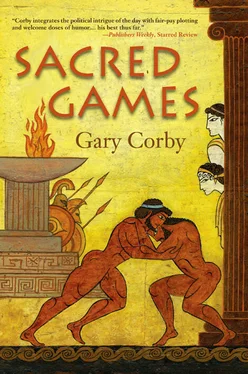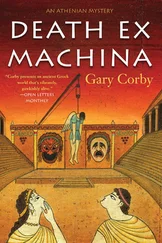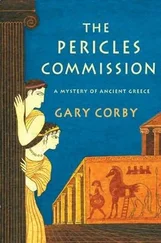Gary Corby - Sacred Games
Здесь есть возможность читать онлайн «Gary Corby - Sacred Games» весь текст электронной книги совершенно бесплатно (целиком полную версию без сокращений). В некоторых случаях можно слушать аудио, скачать через торрент в формате fb2 и присутствует краткое содержание. Год выпуска: 2013, ISBN: 2013, Издательство: Soho Press, Жанр: Исторический детектив, на английском языке. Описание произведения, (предисловие) а так же отзывы посетителей доступны на портале библиотеки ЛибКат.
- Название:Sacred Games
- Автор:
- Издательство:Soho Press
- Жанр:
- Год:2013
- ISBN:978-1-61695-228-0
- Рейтинг книги:3 / 5. Голосов: 1
-
Избранное:Добавить в избранное
- Отзывы:
-
Ваша оценка:
- 60
- 1
- 2
- 3
- 4
- 5
Sacred Games: краткое содержание, описание и аннотация
Предлагаем к чтению аннотацию, описание, краткое содержание или предисловие (зависит от того, что написал сам автор книги «Sacred Games»). Если вы не нашли необходимую информацию о книге — напишите в комментариях, мы постараемся отыскать её.
Sacred Games — читать онлайн бесплатно полную книгу (весь текст) целиком
Ниже представлен текст книги, разбитый по страницам. Система сохранения места последней прочитанной страницы, позволяет с удобством читать онлайн бесплатно книгу «Sacred Games», без необходимости каждый раз заново искать на чём Вы остановились. Поставьте закладку, и сможете в любой момент перейти на страницу, на которой закончили чтение.
Интервал:
Закладка:
Aristotle has a word on the subject too. He says that the ephors, as soon as they came into office, made formal declaration of war upon their own helot slaves, so that there might be no impiety in slaying them.
What made war inevitable was the growth of Athenian power, and the fear which this caused in Sparta .
So said Thucydides in his great history of the Peloponnesian War, and in that one sentence he pretty much sums up why everything went so horribly wrong. If you studied ancient history at school then your stomach is probably churning at the sight of it, because it’s almost impossible to get through any ancient history course without writing a long essay about that sentence!
The Olympic Games of 460 BC was the first after Athens became a full democracy, and the last before the First Peloponnesian War began. Sacred Games plays out, in the microcosm of the Olympics, the hideously complex intercity politics unfolding across Greece. This book takes place almost exactly twenty years after the Persian Wars. In the face of the Persian onslaught, the Greeks had united for the first time (sort of … mostly … even then there were major arguments). But once the Persian War was over, it didn’t take long for the alliance to fracture.
The interweb of alliances and enmities between the Greek city-states was at least as complex as the diplomatic situation in Europe prior to World War I, and just as liable to explode. So when my fictitious Arakos the Spartan is murdered at Olympia, that could be all that was needed to send Greece into a general conflagration.
In the author’s note to The Pericles Commission , I described Athens as a deer caught between two wolves: Sparta and Persia. Now we’re up to book three, and it’s not getting any better for our heroes. Athens has started a war in Egypt; it’s a strategic diversion to force the Persians to send their army there rather than back into Europe. But it’s a huge commitment. If Sparta joins in, things are going to get tricky. Now it looks like Sparta wants to play.
Athens, a city of not more than 250,000 people, barely larger than a modern town, is prosecuting wars on three continents. And right now, they’re winning every one of them.
Nico and Diotima have had a busy year. Which is only fair because the Athenian year spanning 461 to 460 BC was one of the most momentous in human history. Things can get hectic when you’re inventing western civilization.
In The Pericles Commission , Nico and Diotima dealt with internal political threats to the new democracy. In The Ionia Sanction , they dealt with threats from Persia in the east. Now in Sacred Games they’ve seen off danger from Sparta in the west. I think they deserve a holiday.
They’re going home to be married. I’m sure nothing can go wrong there.
EVENTS AND WINNERS OF THE 460 BC OLYMPICS
Nico only gets to see three events, but of course while he’s busy investigating, there’s a real Olympic Games going on in the background. For what it’s worth, here are my notes on who won what at the real Olympics of 460 BC. I’ve included Nico’s efforts so you can see where he fits in. If you’ve read the author’s note, then you’ll know how dodgy the winner lists can be. It’s possible for a winner to be misplaced by sixteen or twenty years. In the great majority of cases we have no idea who won, but where there’s a likely winner, I’ve named him.
I find it hard to believe that every Olympics was run to the same strict timetable. There were a few scheduled items that had to be fixed in stone-such as the opening and closing ceremonies, and the sacrifice of the oxen on Day Three-but beyond that the Greeks probably didn’t care exactly when the events began and ended.
The judges were free to add extra competitions around the edges of the core events. We know for example that this Olympics was one of only fourteen to include a mule race. And of course at these Olympics they added the unique event of murder investigation.
Day 1 — Morning
The Olympic Oath
Competition for the Heralds
The boys’ events: running, wrestling and boxing
A lad by the name of Kyniskos won the boys’ boxing, which we know because a statue was made of him by the sculptor Polykleitos. The winner of the boys’ wrestling was a certain Alcimedon, who was praised by Pindar in a song now known as Olympian 8 . (Which goes to show that Pindar was present at these Games, and that he managed to get some work!)
Day 1 — Afternoon
The afternoon of Day 1 was free time. Fathers looking to find husbands for their daughters would be checking out the prospects. Old friends from different cities would be catching up.
Day 2 — Morning
Nico and Markos take an extra special Olympic Oath.
Chariot Races
there were four:
2-horse chariot race for colts
2-horse chariot race for older horses
4-horse chariot race for colts
4-horse chariot race for older horses
For my own dramatic purposes I had the 4-horse race for older horses run first. Nico and Markos miss the other events.
Horse races
there were three:
Race for stallions
Race for colts
Race for mares
The mule race probably came after the horse races, no doubt for comic relief.
Day 2 — Afternoon
The Pentathlon:
Running
Wrestling
Long Jump
Discus
Javelin
Day 3 — Morning
The sacrifice of the oxen. This was the event of the Games for the ancient Greeks.
Day 3 — Afternoon
First up was the dolichos , which was the long distance race. The winner in 460 BC was the famous Ladas of Argos. He was known as a runner so very light on the ground that his feet never left an imprint. It’s said that he died on his way home from these Olympics, and that a memorial was built by the roadside where he collapsed.
Next came the stadion , which was the sprint event. Needless to say, it was one length of the stadion. The winner is listed as Torymmas of Thessaly. More than any other event, to win the stadion race was to win immortality, because most Olympics were uniquely named by the stadion winner.
Then came the diaulos , which was two lengths of the stadion. Winner unknown.
In the evening a massive barbecue feast was held of the ox meat and, at this particular Olympics, also the bread ox of Empedocles. (Yes, that really happened.)
Day 4
Wrestling
The winner of the wrestling was Amesinas of Barce, who trained by wrestling with a bull while he tended his cattle. He even brought the bull with him for extra practice.
Boxing
winner unknown
Judging of the Murder Investigation event
The winner is listed as Nicolaos, son of Sophroniscus.
Pankration
The winner was Timodemus, son of Timonous.
The hoplitodromos: the race in armor
winner unknown
For the hoplitodromos , competitors ran two lengths of the stadion in standard soldier kit. Nico misses this event, of course, because at that moment he has Timo slung over his shoulders and is racing for the aid station.
Day 5
Closing Ceremony
GLOSSARY
Agora. The marketplace. Every city had its agora, and so too must have Olympia during the Games.
Amphora. The standard container of the ancient world. Amphorae come in many sizes. An amphora vaguely resembles a worm caught in the act of eating far too big a mouthful: wide at the top, tapering to a pointy bottom. Amphorae are used to hold wine, oil, water, olives, you name it. Tens of thousands of ancient amphorae have survived to this day.
Читать дальшеИнтервал:
Закладка:
Похожие книги на «Sacred Games»
Представляем Вашему вниманию похожие книги на «Sacred Games» списком для выбора. Мы отобрали схожую по названию и смыслу литературу в надежде предоставить читателям больше вариантов отыскать новые, интересные, ещё непрочитанные произведения.
Обсуждение, отзывы о книге «Sacred Games» и просто собственные мнения читателей. Оставьте ваши комментарии, напишите, что Вы думаете о произведении, его смысле или главных героях. Укажите что конкретно понравилось, а что нет, и почему Вы так считаете.












